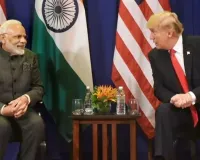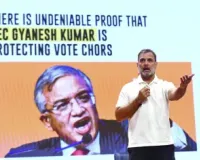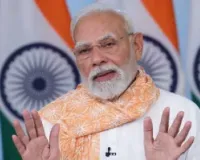US proposes major H1-B visa overhaul, lottery system may be scrapped - a look at the new rules

The Trump administration has proposed scrapping the existing lottery-based selection system for H-1B visas. The US Department of Homeland Security (DHS) has floated new regulations that would replace the random draw with a “weighted selection process” favouring higher wages and advanced skill levels.
What are the new proposed rules?
- According to the DHS proposal, candidates in the highest wage tier earning around $162,528 (Rs 1.35 crore) annually would be entered into the selection pool four times, compared to just once for those in the lowest wage bracket. This system, the administration argues, would prioritize foreign workers who are likely to add greater value to the US economy, while still maintaining opportunities for all wage levels.
- The existing H-1B program, which is capped at 85,000 new visas per year, currently operates through a random lottery system, often criticized for being gamed by large outsourcing firms.
- The new proposal aims to reward companies offering higher wages and discourage mass applications with minimal pay offers. A White House official clarified that this new approach would "discourage companies from spamming the system" and bring integrity back into the program.
“President Trump promised to put American workers first, and this common-sense action does just that,” said White House spokeswoman Taylor Rogers.
$100,000 application fee sparks confusion
This proposal comes just days after President Donald Trump signed a proclamation introducing a one-time 0,000 fee for each new H-1B visa application. The announcement triggered confusion, particularly over whether current visa holders would be affected. However, the White House clarified that the fee only applies to new petitions, and not to renewals or current visa holders. The new fee structure will take effect from the next H-1B application cycle.
The policy shift coincides with high-level meetings between Indian ministers and US officials in New York. Indian External Affairs Minister S Jaishankar and Commerce Minister Piyush Goyal met their US counterparts, including Secretary of State Marco Rubio and Trade Representative Jamieson Greer, to discuss bilateral concerns, including trade and visas.
Jaishankar, in a post on X (formerly Twitter), said the discussion focused on “a range of bilateral and international issues,” while stressing the importance of “sustained engagement.”
What happens next?
The DHS proposal is now open for a 30-day public comment period, during which stakeholders, including employers, immigration lawyers, and advocacy groups, can submit feedback. Final rules could be implemented before the next visa cycle begins, depending on legal and political developments.
About The Author
Welcome to Aryan Age, an English newspaper that has been serving readers since 2011 from Delhi. With a loyal circulation of over 19,000, we are dedicated to providing our readers with the latest news and information, as well as insightful analysis and commentary that help them navigate the complex and rapidly changing world.










Comment List